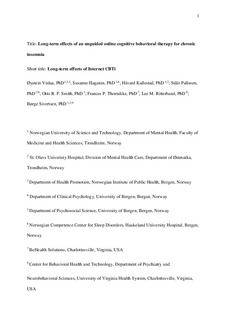| dc.contributor.author | Vedaa, Øystein | |
| dc.contributor.author | Hagatun, Susanne | |
| dc.contributor.author | Kallestad, Håvard | |
| dc.contributor.author | Pallesen, Ståle | |
| dc.contributor.author | Smith, Otto Robert Frans | |
| dc.contributor.author | Thorndike, Frances P | |
| dc.contributor.author | Ritterband, Lee M. | |
| dc.contributor.author | Sivertsen, Børge | |
| dc.date.accessioned | 2020-02-12T12:59:32Z | |
| dc.date.available | 2020-02-12T12:59:32Z | |
| dc.date.created | 2019-01-19T13:30:55Z | |
| dc.date.issued | 2019 | |
| dc.identifier.citation | Journal of Clinical Sleep Medicine (JCSM). 2019, 15 (1), 101-110. | nb_NO |
| dc.identifier.issn | 1550-9389 | |
| dc.identifier.uri | http://hdl.handle.net/11250/2641304 | |
| dc.description.abstract | STUDY OBJECTIVES:
The aim of this study was to test the efficacy of fully automated Internet-delivered cognitive behavioral therapy for insomnia (CBT-I) 18 months after the intervention period on sleep, daytime functioning, and beliefs about sleep for adults with chronic insomnia.
METHODS:
Participants in this study had participated in a randomized controlled trial comparing the efficacy of unguided Internet CBT-I with web-based patient education. Participants who had received Internet CBT-I (n = 95) completed online questionnaires and online sleep diaries 18 months after the intervention period. We used linear mixed models to study changes from baseline to postassessment and to 18-month follow-up, and a separate mixed-models analysis to study changes from postassessment to 18-month follow-up.
RESULTS:
Mean age of the participants was 45.5 years (standard deviation = 12.6) and 64% were females. Sixty-six participants (70%) completed the 18-month follow-up assessment. There were significant improvements from baseline to 18-month follow-up on the Insomnia Severity Index (ISI) (Cohen d = 2.04 [95% confidence interval (CI) 1.66–2.42]) and the Bergen Insomnia Scale (BIS) (d = 1.64 [95% CI 1.30–1.98]), levels of daytime fatigue (d = 0.85 [95% CI 0.59–1.11]), psychological distress (d = 0.51 [95% CI 0.29–0.73]), and beliefs about sleep (d = 1.44 [95% CI 1.15–1.73]). Moderate to large effect size improvements were also shown on the diary-derived sleep variables. All improvements from baseline to postassessment were essentially maintained to 18-month follow-up.
CONCLUSIONS:
Unguided Internet CBT-I appears to have sustained effects on sleep, daytime functioning, and beliefs about sleep up to 18 months after the intervention period. | nb_NO |
| dc.language.iso | eng | nb_NO |
| dc.publisher | American Academy of Sleep Medicine | nb_NO |
| dc.title | Long-Term Effects of an Unguided Online Cognitive Behavioral Therapy for Chronic Insomnia | nb_NO |
| dc.type | Journal article | nb_NO |
| dc.type | Peer reviewed | nb_NO |
| dc.description.version | acceptedVersion | nb_NO |
| dc.source.pagenumber | 101-110 | nb_NO |
| dc.source.volume | 15 | nb_NO |
| dc.source.journal | Journal of Clinical Sleep Medicine (JCSM) | nb_NO |
| dc.source.issue | 1 | nb_NO |
| dc.identifier.doi | 10.5664/jcsm.7580 | |
| dc.identifier.cristin | 1660852 | |
| dc.description.localcode | © 2019. This is the authors' accepted and refereed manuscript to the article. The final authenticated version is available online at: https://doi.org/10.5664/jcsm.7580 | nb_NO |
| cristin.unitcode | 1920,25,0,0 | |
| cristin.unitcode | 194,65,35,0 | |
| cristin.unitname | PH - Østmarka psykiatriske avdeling | |
| cristin.unitname | Institutt for psykisk helse | |
| cristin.ispublished | true | |
| cristin.fulltext | postprint | |
| cristin.qualitycode | 1 | |
